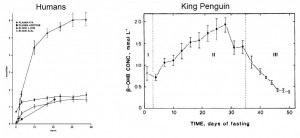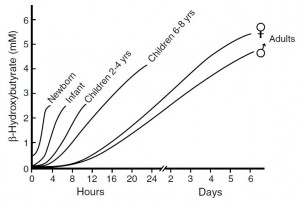Humans are unique in their remarkable ability to enter ketosis. They’re also situated near the top of the food chain. Coincidence?
During starvation, humans rapidly enter ketosis; they do this better than king penguins, and bears don’t do it at all.
Starvation ketosis
Humans maintain a high level of functionality during starvation. We can still hunt & plan; some would even argue it’s a more finely tuned state, cognitively. And that’s important, because if we became progressively weaker and slower, chances of acquiring food would rapidly decline.
Perhaps this is why fasting bears just sleep most of the time: no ketones = no bueno..?
The brain of newborn babies consumes a huge amount of total daily energy, and nearly half comes from ketones. A week or so later, even after the carbohydrate content of breast milk increases, they still don’t get “kicked out of ketosis” (Bourneres et al., 1986). If this were a harmful state, why would Nature have done this? …and all those anecdotes, like babies learn at incredibly rapid rates… coincidence? Maybe they’re myths. Maybe not.
Ketosis in the animal kingdom
Imagine a hibernating bear: huge adipose tissue but small brain fuel requirement relative to body size and total energy expenditure. No ketosis, because brain accounts for less than 5% of total metabolism. In adult humans, this is around 19-23%, and babies are much higher (eg, Cahill and Veech, 2003 & Hayes et al., 2012).
For the rest of this article and more, head over to Patreon!


